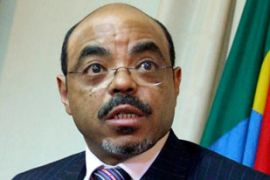Eritrea-Ethiopia tensions simmer
Commission tasked with demarcating border is dissolved as dispute rages.

With no agreement reached on a fully delineated border, the boundary set in the 2002 by the EEBC ruling remains the only legal borderline.
Michela Wrong, an author and journalist, told Al Jazeera that Ethiopia and Eritrea reacted to the 2002 ruling differently.
“While Eritrea accepted the decision unconditionally, Ethiopia has had a real problem with the decision… but they are the power and the country that controls the area which would need to be demarcated,” she said.
“If you are going to see this decision demarcated on the ground, there is only one country that can do that, and that is Ethiopia.
“Essentially it is in the control of one country.”
Fight over border
Ethiopia and Eritrea fought a war over the 1000-mile frontier from 1998 to 2000, which left 70,000 people dead.
|
“There have been many provocations on the part of the Eritrean government but… the only time when we would respond is if there is full-scale invasion of our territory” Meles Zenawi, Ethiopia’s prime minister |
The two countries signed a peace deal in 2000, but their relations have remained tense in the run up to the expiry of the EEBC mandate.
Eritrea has repeatedly accused Ethiopia of planning a new border war, a claim denied by Addis Ababa.
By “refusing to withdraw from sovereign Eritrean territories, the [Ethiopian] regime has already launched an aggression against the Eritrean people,” Asmara said last week.
Meles Zenawi, Ethiopia’s prime minister, told Al Jazeera recently that military conflict over the border issue was only a last resort.
“There have been many provocations on the part of the Eritrean government but we have clearly stated that the only time when we would respond is if there is full-scale invasion of our territory,” he said.
He announced on Tuesday that he had increased Ethiopia’s defence budget by more than $54 million in preparation for any renewed fighting with its neighbour.
“We believe the government in Asmara is well aware of our capabilities and another invasion would lead to their downfall,” Meles told the Ethiopian parliament.
Growing risk
The International Crisis Group last month warned of a “real risk of renewed conflict” within weeks if efforts are not made to avert it.
The policy group claimed Eritrea had some 4,000 troops and military hardware in a UN-supervised buffer zone with 120,000 troops close by.
The ICG also said that Ethiopia had around 100,000 troops along the border.
Ban Ki-moon, the UN secretary-general, has appealed to Eritrea to redeploy out of the region, urging Asmara to lift its continued restrictions on operations of the UN peacekeeping mission UNMEE.
About 1,700 UN peacekeepers have patrolled the Eritrea-Ethiopia frontier since the 2000 peace agreement.
Analysts say the two countries fought a proxy war in Somalia earlier this year.
Eritrea was accused of supporting the Islamic Courts Union (ICU), who fought Ethiopian troops supporting the weak Somalian government.